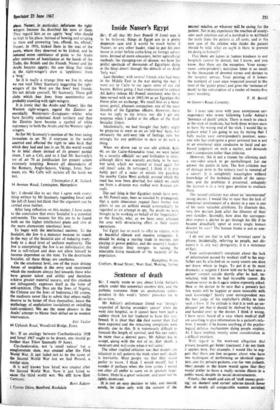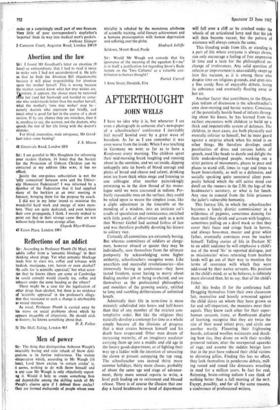Sir: I must take issue with your anonymous cor- respondent
who wrote following Leslie Adrian's 'Sentence of death' article. There is much to attack
in the state of medicine, but both these writers seem to have the wrong end of the stick. I would like to preface what I am going to say by stating that I
fully realise your correspondent's position; some- one who has undergone a great personal loss is not in an emotional state conducive to lucid and un- biased judgment on such a matter, and demands one's compassion rather than criticism.
_However, this is not a reason for allowing such a one-sided attack to go unchallenged. Let me answer the points in turn. The first criticism was of damage done to the urinary tract in removal of a cancer. It is completely meaningless without knowledge of the technical details of the opera- tion. and the problems it presented; unhappily the layman is in a very poor position to evaluate them.
The second criticism was about an 'unconcerned' young doctor. 1 would like to state that the lack of emotional involvement of a doctor in a case is one of his most valuable attributes. To illustrate this, very few doctors look after the illnesses of their own families. Secondly, how does the correspon- dent expect a doctor to get through his life if he became dreadfully upset at every single human disaster he sees? The human frame is not so con- structed.
1 do not see that to talk of 'terminal cases' (a phrase, incidentally, referring to people, not dis- eases) is in any way derogatory; it is a statement of fact.
Your correspondent's complaint about the lack of information passed by medical staff to his step- -father can be attacked on so many counts one does not know where to begin. To put it at its most dramatic: a surgeon I know told me he had seen a patient commit suicide shortly after he had, un- solicited. told him be had incurable cancer. He resolved never to do it again unless expressly asked. How is the doctor to be sure that a person's last few weeks will be happier or more miserable with such knowledge? Surely your correspondent was the best judge of his stepfather's ability to take such a blow. If the attitude is that it is such an un- pleasant job that it should be shelved by relatives and handed over to the doctor, I think it wrong.
have never heard -of a case where medical staff are unwilling to give information to a patient's rela- tives. 1 wonder if he knows anything of the psycho- logical defence mechanisms dying people employ. As 1 have .implied, merely some consideration in a difficult problem.
With regard to the worn-out allegation that private patients get better treatment. I do not think it applies here. For example, I would like to sug- gest that there are few surgeons about who have two techniques of performing an identical opera- tion–one for private patients, one for NHS patients. Mast people in the know would agree that they would prefer to have a really serious illness in a public ward. despite its social inconveniences.
Eissalis, the result and aim of 'staff money -grub- 4se. doctors' and nurses' salaries (much lower Ikon aeariy all comparable western societies) make up a surprisingly small part of mis finances. Very little of your correspondent's stepfather's 'supertax' finds its way into medical men's pockets.
Anthony Eisinger
2 Cameron Court, Augustus Road, London SW19































 Previous page
Previous page